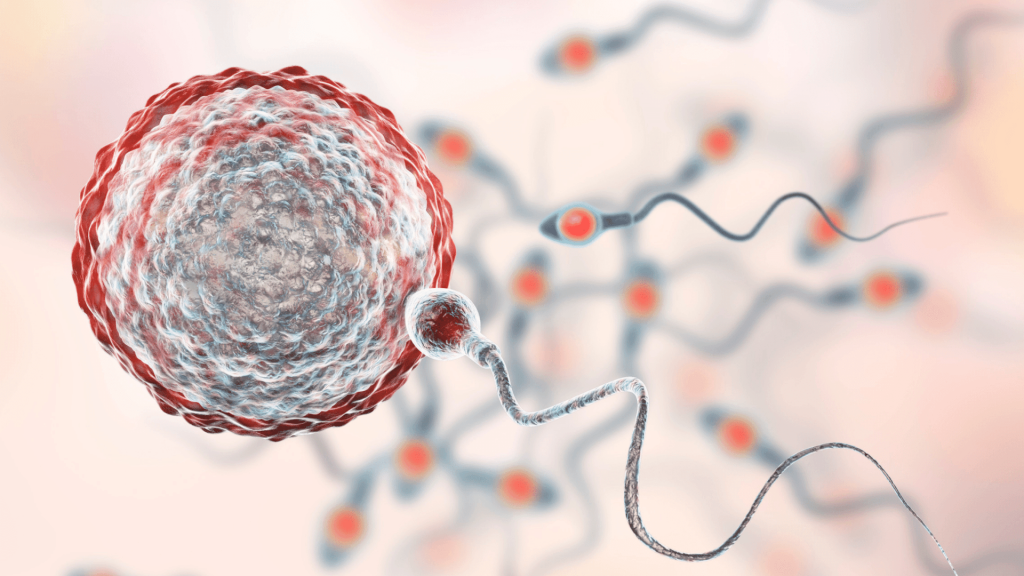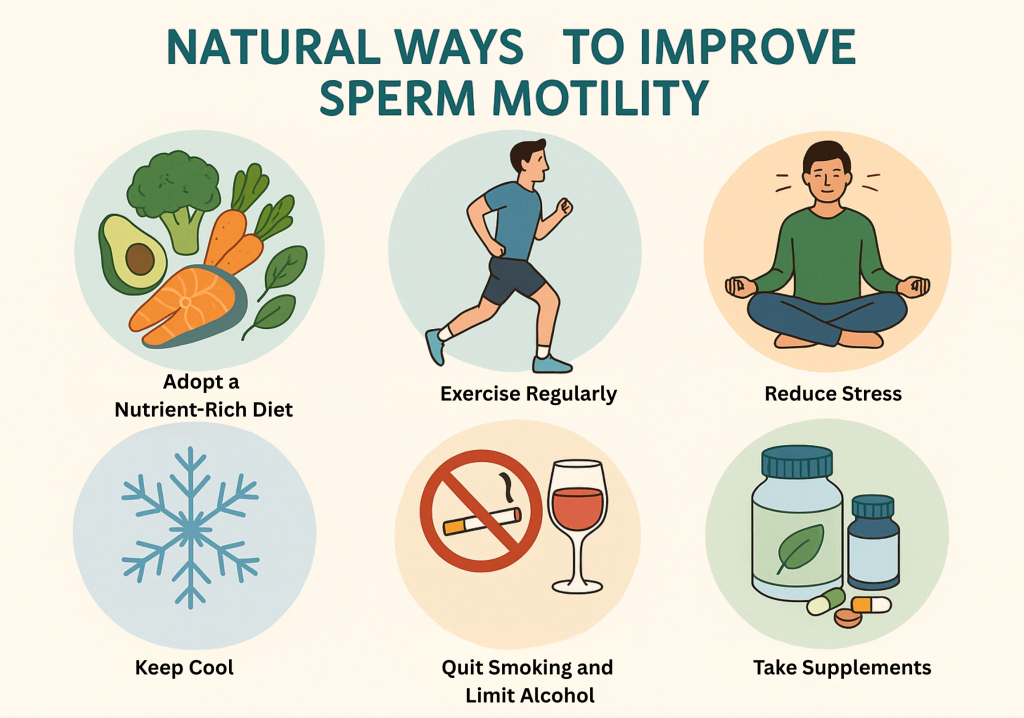How to Improve Sperm Motility with Diet and Lifestyle
Improving sperm motility is crucial for couples struggling with infertility, as sperm motility directly impacts the chances of fertilization. Poor motility means the sperm has difficulty reaching and fertilizing the egg, which can result in infertility.
At Lakshmi Fertility Centre, Karaikudi, we understand how critical sperm motility is in achieving pregnancy. The good news is that there are several effective ways to improve motility, ranging from natural diet and lifestyle changes to advanced fertility treatments like IVF, IUI, and ICSI. In this article, we’ll share trusted tips, evidence-based practices, and explain how fertility treatments available at our clinic can help you progress on your fertility journey.

What Is Sperm Motility?
Sperm motility refers to the ability of sperm to move effectively and efficiently. For sperm to successfully fertilize an egg, they need to swim through the female reproductive system to reach the egg. Sperm that moves slowly or ineffectively can result in fertilization failure and, ultimately, infertility. Healthy sperm motility is one of the key factors for successful conception. Low motility is one of the most common causes of male factor infertility and can impact the success of natural conception or assisted reproductive technologies (ART).
Common Causes of Low Sperm Motility
There are numerous factors that can contribute to low sperm motility, including:
- Hormonal Imbalance: Hormones such as testosterone, luteinizing hormone (LH), and follicle-stimulating hormone (FSH) play a vital role in sperm production. Any imbalance can affect sperm quality and motility.
- Infections or Medical Conditions: Certain medical conditions like varicocele (enlargement of veins in the scrotum) or infections in the reproductive tract can reduce sperm motility.
- Unhealthy Diet and Lifestyle: A poor diet lacking essential nutrients, combined with a sedentary lifestyle, can negatively impact sperm motility.
- Smoking, Alcohol, or Drug Use: Smoking, excessive alcohol consumption, and recreational drug use can harm sperm quality, including motility. These habits lead to oxidative stress, which damages sperm cells.
- High Scrotal Temperature: High temperatures can impair sperm production and motility. Regular exposure to hot tubs, saunas, or wearing tight clothing can elevate the scrotal temperature and reduce motility.
- Environmental Toxins: Exposure to environmental toxins such as pesticides, chemicals, and heavy metals can negatively affect sperm quality, including motility.
At Lakshmi Fertility Centre, we offer comprehensive male fertility evaluations to help identify and treat the underlying causes of low sperm motility, ensuring that your fertility journey is as effective and informed as possible.
Best Fertility Treatments for Low Sperm Motility
If lifestyle changes alone are insufficient to improve sperm motility, advanced fertility treatments can offer the next best step. At Lakshmi Fertility Centre, we specialize in providing the best fertility treatments for men with low sperm motility, offering a comprehensive approach to care that may include medical interventions, IVF, IUI, and ICSI.
Intrauterine Insemination (IUI)
IUI is a popular and non-invasive fertility treatment that involves placing concentrated sperm directly into the uterus around the time of ovulation. This procedure increases the chances of sperm reaching the egg, particularly in cases of mild male infertility.
IUI success rates range from 10–20% per cycle, depending on various factors such as the woman’s age, sperm quality, and the underlying cause of infertility. According to the American Pregnancy Association, IUI is often recommended for couples with mild male factor infertility or unexplained infertility due to its simplicity and moderate effectiveness.
In Vitro Fertilization (IVF)
IVF is one of the most advanced infertility treatments, ideal for couples facing severe male factor infertility, including low sperm motility. During IVF, eggs are retrieved from the female partner, fertilized with sperm in the laboratory, and the resulting embryo is transferred into the uterus.
Success Rate: IVF success rates typically range from 30% to 50% per cycle, with the rate varying based on the woman’s age, egg quality, and clinic protocols. This data is consistent with national ART statistics reported by the CDC.
Intracytoplasmic Sperm Injection (ICSI)
ICSI is a more specialized form of IVF, especially useful for men with very low sperm count or poor sperm motility. In ICSI, a single sperm is injected directly into an egg, bypassing the need for motility. This technique is highly effective in overcoming male infertility.
Success Rate: ICSI achieves a fertilization rate of 60–80% per injected egg, making it one of the most reliable options when sperm motility is severely impaired. According to the CDC’s Assisted Reproductive Technology data, ICSI is frequently used in male infertility cases due to its consistently high success in achieving fertilization under challenging conditions.
Natural Ways to Improve Sperm Motility
While medical treatments are available, several lifestyle changes can naturally improve sperm motility and overall sperm health. Here are some of the most effective methods:

1. Adopt a Nutrient-Rich Diet
A healthy, balanced diet is essential for maintaining healthy sperm. Consider incorporating the following foods:
- Leafy greens (rich in folate)
- Walnuts (rich in omega-3 fatty acids)
- Eggs (rich in vitamin E)
- Pumpkin seeds (high in zinc)
- Berries (packed with antioxidants)
A Harvard study suggests that foods rich in antioxidants can improve sperm quality and motility by reducing oxidative stress. Nutrients like zinc, selenium, and folate are particularly beneficial for sperm production.
2. Exercise Regularly
Moderate physical activity improves testosterone levels, sperm quality, and overall health. Brisk walking, swimming, cycling, and strength training can all help regulate hormones and support sperm motility. However, it’s important to avoid overtraining, as excessive physical strain can increase oxidative stress and reduce fertility.
3. Reduce Stress
Chronic stress can significantly affect hormone production, leading to low sperm count and motility. Regular stress management techniques, such as yoga, meditation, and relaxation exercises, can positively impact sperm health. Engaging in hobbies or activities that help you relax also plays a vital role in supporting fertility.
4. Keep Cool
Heat negatively affects sperm production and motility. Avoid hot tubs, saunas, or wearing tight underwear that can elevate scrotal temperature. To protect sperm health, it’s best to maintain a temperature lower than the body’s core temperature for optimal sperm production.
5. Quit Smoking and Limit Alcohol
Both smoking and excessive alcohol consumption have been linked to reduced sperm motility, damage to sperm DNA, and overall infertility. Quitting smoking and limiting alcohol intake can improve sperm health and fertility. The World Health Organization warns that smoking is a significant risk factor for male infertility.
6. Take Supplements
Certain supplements can support sperm motility by reducing oxidative stress and improving sperm energy levels. Consider supplements like:
- Coenzyme Q10
- L-carnitine
- Zinc
- Selenium
- Vitamin C & E
A review from the National Library of Medicine highlights that these supplements can help improve sperm motility, especially when combined with a healthy lifestyle.
Frequently Asked Questions (FAQs)
1. Can sperm motility be improved naturally?
Yes, with a healthy diet, regular exercise, stress reduction, and avoiding harmful habits, sperm motility can often be improved.
2. How long does it take to improve sperm motility?
It can take about 2 to 3 months of lifestyle changes to see improvements in sperm motility, as sperm production takes around 74 days.
3. Is ICSI better than IVF for poor motility?
ICSI is often used in IVF when sperm motility is very low, as it directly injects sperm into the egg, bypassing the need for motility.
4. Do supplements really help with sperm motility?
Yes, supplements like CoQ10, zinc, and vitamin E can help support sperm motility, especially when paired with a healthy lifestyle.
5. When should I see a fertility specialist?
If you’ve been trying to conceive for over a year (or 6 months if the female partner is over 35), it’s time to consult a fertility expert.
Conclusion
Struggling with low sperm motility can feel discouraging – but there is real hope, and proven solutions are available. At Lakshmi Fertility Centre, Karaikudi, we understand the emotional and physical challenges that come with fertility issues. That’s why we combine personalized care, cutting-edge fertility treatments, and a compassionate approach to help you overcome barriers to conception.Whether you’re just beginning your fertility journey or seeking advanced treatments like ICSI, IVF, or IUI, we’re here to support you with the latest medical expertise and genuine care.
Book your consultation today! and let our dedicated team help you turn possibility into parenthood.
